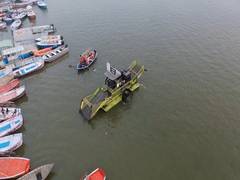NMCG’s new 20 MLD CETP in Kanpur leads high-tech solution to Ganga Pollution
Kanpur (Uttar Pradesh) [India], October 10 (ANI): Kanpur, a city long afflicted by untreated effluents from tanneries, sees a promising shift with the inauguration of a state-of-the-art 20 MLD Common Effluent Treatment Plant (CETP).
While the old 36 MLD CETP at Jajmau struggled with efficiency, the new 20 MLD CETP constructed by the National Mission for Clean Ganga boasts cutting-edge technology for optimal operation and maintenance.
From chemical sludge thickeners to fine drum screens, every component is modernized to ensure effectiveness.
Vikas Tiwari, Manager of Operations and Maintenance at the 20 MLD CETP, said, “This 20 MLD plant is in ready condition. We have two streams of 10 MLD each; one stream is ready, while we are currently developing biomass in the other. The biomass development is progressing well, and the other stream is prepared to take the effluent. From our side, we are ready to accept the effluent. We are confident that, with the proper effluent, this plant will operate successfully if everything goes smoothly.”
Recognizing the complexity of Ganga cleaning in Kanpur, the National Mission for Clean Ganga took a multifaceted approach.
In November 2018, the historic Sisamau drain, discharging over 140 MLD of sewage into the Ganga, was effectively diverted, marking a significant step in river conservation at a cost of over Rs 60 crore.
This initiative highlights the commitment to tackling various aspects of pollution in the city, ensuring the preservation of the sacred river and its tributaries.
The National Mission for Clean Ganga (NMCG) is the implementing agency for the Namami Gange program, focusing on a comprehensive approach to rejuvenating the Ganges River.
It undertakes various initiatives aimed at reducing pollution and restoring the river’s ecological balance.
Key initiatives include the establishment of sewage treatment plants (STPs) to effectively manage waste and improve water quality, along with the construction of river surface cleaning systems to remove debris and pollutants.
The mission also promotes afforestation along riverbanks to combat soil erosion and enhance biodiversity.
Public awareness campaigns play a crucial role, in educating communities about the importance of the Ganges and encouraging their active participation in conservation efforts.
Additionally, NMCG supports sustainable tourism and livelihood programs to empower local communities, ensuring they benefit from the river’s health while fostering a sense of stewardship.
Through these multifaceted efforts, the NMCG aims to create a cleaner, healthier Ganges for both people and the environment.






